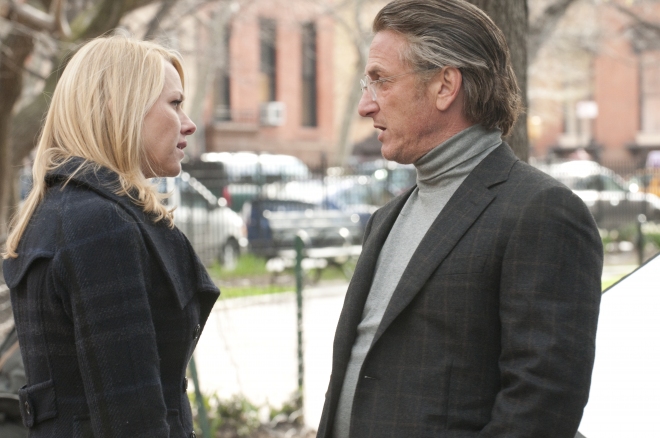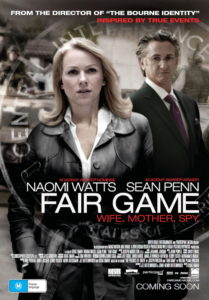In 2003, the formerly classified CIA operative Valerie Plame was outed in a Washington Post article. Her husband, former Ambassador Joseph C. Wilson, went on record in various media outlets as saying that the outing was the direct result of his formally contradicting the US position on weapons of mass destruction (WMDs) in Iraq in his article “What I Didn’t Find in Africa”. Whatever the cause of the exposure was, the White House move had its impact: attention was distracted from the real issues behind the US invasion of Iraq, and Plame’s life was allegedly left in tatters. Based on the books The Politics of Truth by Wilson and Plame’s own Fair Game: My Life as a Spy, My Betrayal By the Whitehouse, director Doug Liman’s (The Bourne Identity) Fair Game examines the events that ultimately resulted in public indictments and a civil suit against heavy-hitters I. Lewis “Scooter” Libby, Dick Cheney, Karl Rove, and Richard Armitage.
The action in the film begins in 2003, around the time Valerie Plame (Naomi Watts, Eastern Promises) discovers that Iraq has no active nuclear weapons program, despite the insistence of many U.S. government official to the contrary. Valerie’s husband and former ambassador Joe Wilson (Sean Penn, Milk) is sent to Africa to investigate the possibility that some states are selling enriched uranium to Iraq. However, despite Joe finding no such deals taking place, the US (as we all know by now) goes ahead and wages war on the country anyway. Wilson’s article “What I Didn’t Find in Africa” causes an immediate stir, and Plame’s identity is leaked to the press. With threats to their family and working lives now imminent, Wilson goes on a mass-media blitz to inform the world that a cover-up is taking place.
A big smoke-screen in the lead-up to this film was not the CIA cover-up, but the advertising campaign. The official trailers for this film painted Fair Game to be a taut political thriller, with Bourne-style intrigue around every corner. The tags of “From the director of The Bourne Identity” perhaps added to this, although undoubtedly “From the director of Swingers” may have also sent mixed messages. That we do not get this is not a bad thing in and of itself, as the whole Bournesque spy film (through Bond-reboot Casino Royle and more recently Philip Noyce’s Salt) is starting to feel a little played. Then again, there is nothing especially new or fresh about Fair Game either. Viewers should be outraged by the events of 2003, but so much has happened in the last seven years that have exposed us to the mis-truths of governments in relation to the wars in the Middle East, that the majority will be forced to ask four simple questions: Yeah? And? So? What?
Had this film dropped back at the time the events were occurring, when they were plastered all over the news, then this film may have had more impact. Despite large chunks of the American public still believing that Saddam Hussein was responsible for the 9/11 attacks, and 46% of Republicans believing that US President Barack Obama is a Muslim, the whole world must surely be aware of the lack of WMDs in Iraq by now. There is nothing particularly revelatory about the US government not being entirely truthful about the reasons for entering the Iraq War, and the persecution of two low-level government employees is not exactly a stretch from that knowledge. A slow-paced but nonetheless interesting thriller is ultimately undermined by an uninspired take on what could have some of the most hard-hitting filmmaking on Iraq for the masses since the conflict began. Instead, it is a well-acted, albeit ultimately restrained, thriller.
Fair Game screened last week at the Brisbane International Film Festival, and is released in Australia on 25 November 2010 through Hoyts Distribution.






No Responses